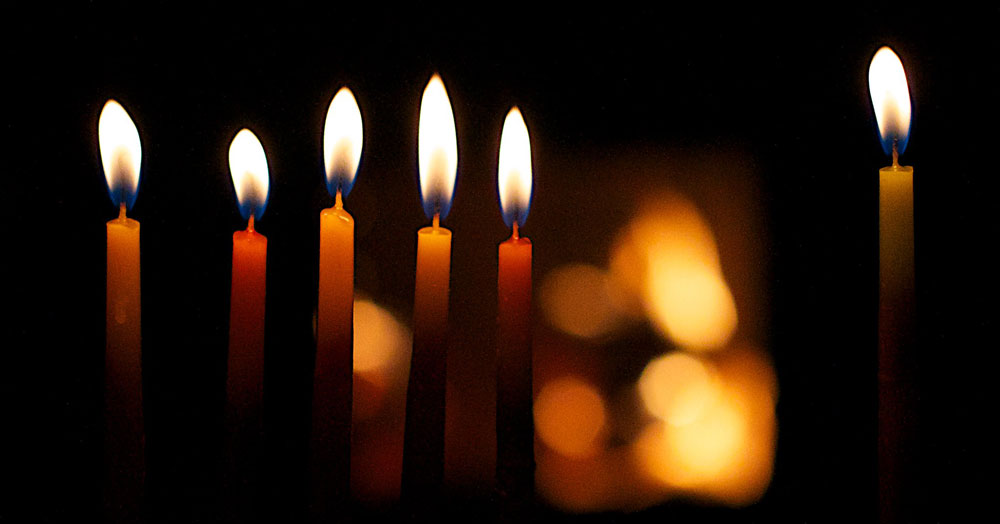Community Blog Blessing for the Month of Kislev (and Thanksgiving too)

Gratitude is a complicated business.
Tomorrow, around tables all over the country, Americans will gather with loved ones and give thanks—for personal blessings of abundance, for family and friendship, for physical sustenance, for shelter, for the comfort of a warm home.
It’s hard to argue with. Even those who might argue with turkey on principled vegetarian grounds would be hard-pressed to argue with cranberry sauce, stuffing, and pumpkin pie!
And it’s even harder to argue with the way in which a posture of genuine gratitude can open the heart, lift the spirits, clear the mind, and turn us toward rather than away from one another.
And yet, for many, Thanksgiving is not a simple day.
There are the complexities bound up with the history of the holiday itself—the ways in which it perpetuates a collective myth that obscures troubling aspects of our national story and erases the genocide of indigenous people on which this country was built.
There are the more personal, intimate complications that come with the day each year—what it means for those who will be grieving a recent loss that has left a seat at the table unbearably empty, for those who have no table at all, with neither food nor shelter to warm them, those who are alone for the holiday, those whose families are not safe, or those whose families are too fractured to come together at all.
For many of us, there is another layer of complexity this year, as we reckon with the rising tide of hate and violence in communities across our country and around the world. Still shaken by the brutal attack at a popular LGBTQ nightclub in Colorado Springs just a few days ago, we woke up this morning to news of still more violence. Another fatal shooting in Virginia. Bombings at bus stops in Jerusalem. The lethal litany continues.
As Jews, in particular, many of us are confronting the insidious reality of antisemitism in this country in new ways. After years of increasingly violent white supremacy on the right, and increasingly virulent antizionism on the left, we are now witnessing the rise of normalized antisemitism in the center. It is not always easy to discern where inherited trauma ends and all-too-immediate threats to our safety and security begin.
How do we hold all of this as we create space for gratitude in our homes and in our hearts this Thanksgiving?
The questions, of course, go beyond the day itself.
How do we embrace and express gratitude in a way that doesn’t flatten the experience of those who are struggling with loneliness, loss, grief, and sorrow? How do we experience genuine gratitude without denying the real heartache, fear, and outrage we ourselves may be feeling? How do we cultivate gratitude without wielding it as a bludgeon, silencing the human need to give voice to the sometimes-painful truths of our lives? How do we cultivate gratitude that is clear-eyed and stronghearted about the long and difficult work ahead?
As I reflect on these questions, I am grateful for a serendipitous convergence on the American and Jewish calendars this year. Tomorrow morning, as we are preparing our Thanksgiving meals, we will also be entering the Hebrew month of Kislev, the month in which Jews all over the world celebrate Chanukah, the Jewish festival of lights.
How might Kislev—and Chanukah—invite us into a more spacious approach to gratitude—an approach that allows the stirrings of genuine thankfulness and wonder to awaken and well up within us, while leaving room to be honest about the rest of what is happening in our hearts and in our world?
Here I want to turn to the image of the menorah—or hanukkiah—that stands at the heart of Chanukah and offer four ways in which it can illuminate our experience of gratitude all year round.
First, take one small step. The rabbis ask, if the miracle of Chanukah is that the small flask of oil in the Temple lasted for eight days when it should have only lasted for one—then what was the miracle of the first day? The answer: that the people bothered to try lighting it at all. Whatever it was—faith or desperation or a little of both—they gave it a shot. Sometimes we need to start small, and let gratitude grow gently, slowly, patiently, over time. Rushing it doesn’t work.
Second, remember that darkness is part of the picture. Chanukah is not about banishing darkness completely. It is about kindling a little bit of light in the midst of darkness. In the words of Parker Palmer, the great teacher of teachers, “When we so fear the dark that we demand light around the clock, there can be only one result: artificial light that is glaring and graceless and, beyond its borders, a darkness that grows ever more terrifying as we try to hold it off. Split off from each other, neither darkness nor light is fit for human habitation. But if we allow the paradox of darkness and light to be, the two will conspire to bring wholeness and health to every living being.” Accepting darkness and light as part of our lives creates the only ground in which genuine gratitude can grow.
Third, have the humility to ask honest questions and listen carefully to the answers. In the haftarah that we read on Shabbat Chanukah, the prophet Zechariah is visited by an angel who shows him a vision of an elaborate menorah all made of gold. Zechariah doesn’t understand the vision and he asks the angel what it means. When the angel responds incredulously, “[Really?] You don’t know what those things mean?!” Zechariah is neither embarrassed nor defensive. He says simply, “No, my lord.” I love this moment of prophetic humility. It is what makes it possible for Zechariah—and us—to hear the revolutionary message of the menorah that follows. “Not by might nor by power but by My spirit, said the Lord of Hosts.”
Fourth, we’re part of a larger story and we are in this for the long haul. The obligation to light a menorah goes all the way back to the holy tabernacle, and later the Holy Temple, in which we were commanded to keep the light of the menorah kindled continuously. This is the “ner tamid,” the eternal light that must never be allowed to go out. Chanukah itself marks the rekindling of the “ner tamid” when the Maccabbees rededicated the Temple that had been defiled by Greek conquerors. Eventually, when the second Temple was destroyed, and the menorah deported to Rome as a symbol of the Roman conquest, a separate light was lit in every synagogue, to remain faithful to the original command. As a people, we have been through dark times before, and we have learned what it means to keep a light burning always, wherever we are. This is a light that those who hate us can never extinguish.
May this month of Kislev open our hearts to gratitude that grows from patience, from acceptance, from humility, and from unending hope.
As we kindle the lights of Chanukah this year, one candle from another (ner mi’ner), may we kindle the lights within each of us, one spirit from another, without end.


